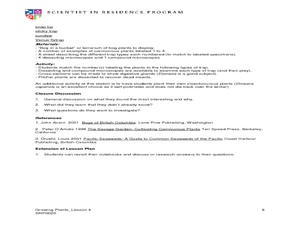Curated OER
The Microscope and Cell
In this science worksheet, students calculate the size of different samples using the microscope as part of a formal lab assignment.
Curated OER
Dissecting Frog Embryos: Cell Membranes and Mitosis
Young scholars use high powered dissection microscopes to dissect and examine frog embryos as well as see balls of cells that were produced by rapid division. The concept of mitosis links to the lesson.
Curated OER
Flower Dissection
In this science activity, students follow directions for dissecting a flower. Students tape the parts of the flower in the corresponding boxes. Students also read about how flowers reproduce and analyze a related diagram.
Curated OER
Using Microscopes In The Classroom
Get up close and personal with parts of a microscope lesson plans and activities for elementary students!
Curated OER
Seed Dispersion of Strawberries and Dandelions
Learners investigate how seeds are dispersed on land. In this plant biology lesson, students use a dissecting microscope to study strawberry seeds and dandelion seeds, they draw what they see, then create a hypothesis on the seeds...
Nuffield Foundation
Dissection of the Ventilation System of a Locust
Jiminy cricket! If you find yourself plagued by fear of dissection, these locust respiratory system dissection directions will walk you through everything you need to know. Teens inspect a living locust to begin with, then jump over to...
Curated OER
Case Study Two: Shark Dissection
Students read an article on sharks prior to beginning a dissection lab. As part of the lab, students identify differences between the shark anatomy and human anatomy and hypothesize why those differences exist.
Nuffield Foundation
Dissecting Lungs
Here is a lab activity where teens experience the respiratory system first-hand as they dissect lungs and identify key structures within the system. Although the website is written in British English with some slightly different verbiage...
Science 4 Inquiry
Plant Structures Lab Stations
In China, hibiscus is known as the shoe flower because it is used to polish shoes, while in Hawaii, it is honored as the state flower. Young scientists learn about the structure and function of flowers. They dissect hibiscus...
Columbus City Schools
You Can’t Sneeze On This Tissue
Take your class' understanding of cells to the next level... or levels! Demonstrate the levels of organization using a variety of engaging methods. The teacher's guide includes the materials you'll need to execute a flower...
Curated OER
Exploring Microscopes
Pupils explore the parts of a microscope. In this microscope lesson, students examine simple and compound microscopes. Pupils discover how the parts of a microscope work together to generate an image.
Science Friday
Termite Symbiosis
What happens to the wood a termite eats? Pupils learn about the three types of symbiosis with pictures of symbiotic pairs. Afterward, they determine whether there is a symbiotic relationship with a termite by dissecting termites and...
Rural Science Education Program
Bees and Flowers – Partners in Pollination
Why are bees so important? After several activities where kids investigate the form and function of flowers, they learn about the different types of bees and label them. They then examine pollen under a microscope and decide which bees...
Curated OER
The Parts of a Perfect Flower
Students explore the parts of a flower. In this flower structures lesson plan, students study a model of a flower and dissect a flower. They label each structure of the flower and observe the pollen grains and ovules under the dissecting...
Curated OER
Classification of an Invertebrate: Sponge
Students investigate the invertebrate sponge. In this invertebrates lesson plan, students observe the sponge, Grantia, using a dissecting microscope. Students answer questions about their observations and view six other invertebrates....
Curated OER
The Internal Anatomy of the Grasshopper
Sixth graders explore the internal organs of grasshoppers. They determine the function of the organs through a dissection activity.
Curated OER
Measuring Permeability of Soil, Sand and Gravel
Middle schoolers investigate the different materials in their environment. In this geology instructional activity, students collaborate in groups to examine the differences in sand, soil and gravel. Middle schoolers utilize a...
Curated OER
Classification of an Echinoderm
Students study starfish through dissection. In this biology lesson plan, students explore the lives of starfish as they view a slide show, observe parts of echinoderms, and compare the classification of the starfish with other...
Curated OER
Frogs
Students explore the external and internal structures of an amphibian and how frog anatomy compares to human anatomy. They collect pictures of a frog using a digital camera, create a web page, develop a PowerPoint presentation, and...
Curated OER
The Energy of Life in Zebrafish
Learners study the stages of development of an unknown organism. In this zebrafish lesson, students examine and collect data as they use microscopes to view a zebrafish embryo.
Curated OER
Microscopy Exercises
Students explore organisms and botany by utilizing microscopes. In this microscopic research lesson, students define many plant and organism related vocabulary terms such as conifers, moss and spores. Students view spores and other...
Curated OER
Barn Owl Pellet Lab
In this lab worksheet, students dissect a barn owl pellet then identify the different small animals found in the owl pellet. Using class data they calculate percentage present as well as complete 8 post lab questions.
Central Bucks School District
Igneous Rocks Lab
Searching for a simple igneous rocks experiment to assist pupils with rock classification based on texture and composition? In the activity, pupils view multiple rocks in various ways to determine texture and composition. They then...
Curated OER
Pollen Tube Growth
Students demonstrate the proper usage of the compound and dissecting microscopes. They identify the parts of a flower and the functions of the flower parts. Students describe the process of gamete formation and fertilization in a flower.

























